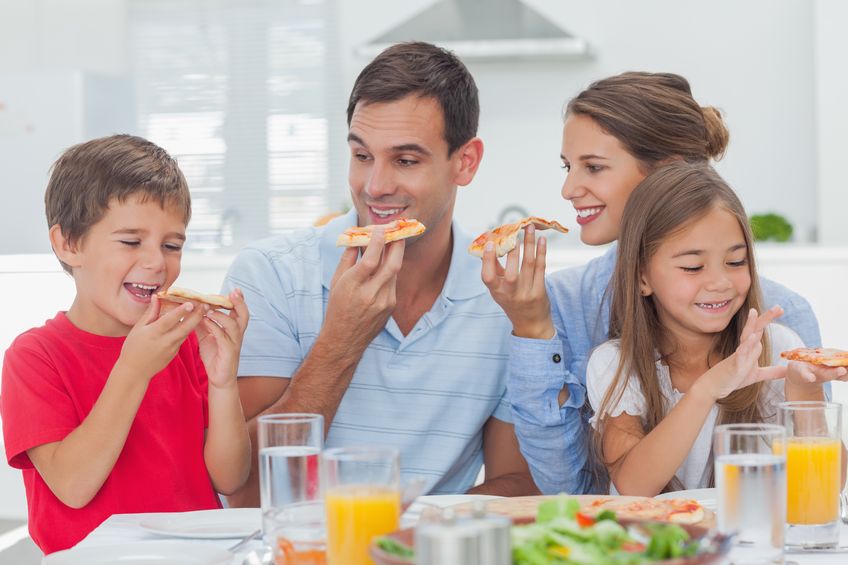
The skill of “Eating Just Enough” might be the crown jewel of eating skills. It can take the most practice, but it is by far the most worth it. We know that people who have the skill of eating just enough have the best weight loss, weight loss maintenance, the highest well being, and the best and most resilient body image.
There Are Two Opposite Poles of Eating Just Enough (EJE)
Let’s say that you were looking at two opposites: On one end, you were doing EJE with pizza. On the other end, you were doing EJE with chicken, rice, and broccoli (the hardest dying stereotype of what you would eat to lose weight). In reality, neither one of those is going to make up the majority of your meals, but they’re really useful to illustrate the spectrum of EJE skill practice.
With Pizza: You probably want to portion it out ahead of time, because you might not be able to trust your stomach to tell you when to stop. You probably have to wait a certain amount of time after eating to be able to see how full and satisfied you are.
With chicken, rice, and broccoli: You can very reliably trust your stomach with when to stop, during the meal.
In between those two poles, you have a million shades of grey. Hopefully, many of your meals are some combination of protein, carbohydrates, and fats, with a generous helping of vegetables, and some amazing seasoning or delicious sauce to make it taste wonderful. What’s really great to notice, is that you can set yourself up for any kind of food, at any time, and trust yourself.
With pizza, you might know that you can trust yourself 20-30 minutes after eating, but not during eating. So you portion out a healthy amount, eat it, and then go do something else, until after that time.

How To Eat A Healthy Amount Of Pizza
Would someone really have two or three slices of pizza, with a salad, and then stop? They will if they build the skill to.
Part of it is just accepting that, with a food like pizza, you are going to want far more than you need. The amazing thing is that if you give yourself a normal, healthy, one person portion, you can eat that and stop.
Stopping requires three and a half simple skills:
- Accept that when you finish that normal size portion, all humans will still want to eat more.
- Talking yourself through knowing that it’s enough, you know that in twenty minutes you’ll feel totally happy and satisfied, and feel good that you had the right amount.
- Immediately go do something else for that twenty minutes. You could go do something fun. Or, since everyone is busy, you could go check something off of your to-do list, and have a double win. Or, if people you love are around, you could talk to them. Those are three options that are 100x more nourishing to your life than white-knuckling staring at an empty plate or an open pizza box.
- Notice 20 minutes later that you actually feel totally full and satisfied, and how happy you feel that you ate the right amount. Notice how much better it feels to have had the right amount, vs. that gross over-stuffed feeling people have when they kill half of a pizza. Be stoked that you can have pizza and still hit your goals.
Twin Skills: Portion Size And EJE
Georgie came up with the best analogy for how portion size and eating just enough work together — that it’s like buying shoes. When you buy shoes you don’t try on every shoe, you have a pretty good idea of what the right size is going to be, and you start there. You make your adjustments (a higher size up or down) starting from what’s usually a pretty good place. With food it’s the same way — you want to pay attention to your stomach, but you want to set yourself up with what’s probably pretty good right from the get-go. You can get a little more later if it was too little, or you can stop early if it was too much.
Most things you eat won’t be pizza and they won’t be chicken, rice, and broccoli. Most things will be in the middle somewhere.
That means that for most things, you want to use some blend of EJE and portion size. Adjust the blend depending on your situation:
- Let’s say you ate the meal way too fast — that’s a good time to rely on portion size over EJE.
- Let’s say you eat really slow — You can probably rely on EJE instead of portion size.
- If you cook something remarkably delicious — Set yourself up with pretty healthy portions, then use EJE as your guide.
- Let’s say your meal is under-seasoned and not delicious — Add more seasoning LOL!
You Have More Options Than You Think
Most diet-based food philosophies will tell you that certain foods are “clean” and certain foods are “dirty.” Fortunately, research tells us that not only is that not true, but the level to which you believe in clean and dirty is an extremely effective predictor of weight loss failure.
Let me repeat that: Most people who tell themselves that foods are “clean” and “dirty” will fail at weight maintenance.
Because you are interested in maintaining weight loss for the rest of your life, you practice telling yourself that foods are simply more or less calorically dense, and more or less tasty.
Unbalanced, hyper-delicious, calorically dense foods can totally be part of your weight loss program, but you want to apply a certain amount of portion sizing to them.
On the other hand, foods that are less calorically dense, high fiber, and have a balanced amount of proteins carbohydrates and fats make it much easier to just trust your stomach and eat just enough.
But isn’t it nice knowing you can eat whatever you want and still get results?
You’ve got choices.
By Josh Hillis
Author of Fat Loss Happens on Monday (2014), and Lean and Strong (upcoming 2019), for OnTarget Publications

Leave a Reply